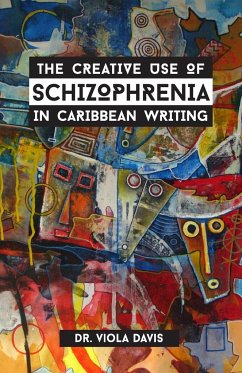Dr. Viola Davis' THE CREATIVE USE OF SCHIZOPHRENIA IN CARIBBEAN WRITING, (Revised Edition) focuses on the literary works of four of the Caribbean's most prominent writers: Edward 'Kamau' Brathwaite of Barbados, Wilson Harris of Guyana, VS. Naipaul of Trinidad and Tobago and Derek Walcott of St. Lucia. Both Naipaul and Walcott have since become Nobel Laureates in Literature. Dr. Davis uses the idea of the use of schizophrenia as the basis for her analysis of the expression of these Caribbean writers. -------------- This work is Dr. Davis' master's dissertation. It is an academic effort, but it does not 'kafuffle' the brain-box or 'cat-spraddle' reason. Rather, like any good piece of literature, it prompts that investigative process and encourages a fresh look at the conventions we entertain, especially about the literature of four of the Caribbean's post-independence visionaries, and at West Indian literature in general. When I speak of West Indian literature, I include that popular voice nestled in the heartbeat of reggae and calypso music. At the sub-textual level, The Creative Use of Schizophrenia in Caribbean Writing provokes a connection with all of these voices. Even though Dr. Davis does not entertain a popular style, we are connected through this new voice of the region's literati to a process which seeks to deepen our understanding of those three dualities that are present everywhere in Caribbean literature: self/other, freedom/servitude and exile/homecoming. This outstanding work reminds us that 'the pleasure of exile' is a constant state of mind; a fateful journey of which George Lamming speaks, taking us to that same place where Bob Marley goes: you running and you running but you can't hide from yourself. What more forceful image of a split personality can there be than a man or woman running from his/her self? This image epitomises a 'disintegration of the emotional stability', a schizophrenia. It also creates a picture of a sick soul in the middle of a never-ending journey -- Marley again: one step forward two steps backwards -- always in the middle. Tony Thompson, Actor, Broadcaster Dr. Davis' work examines an important area of concern within Caribbean literature and culture. In focusing on schizophrenia and the creative spirit this book revisits a set of concerns that helped to propel Caribbean literature and its criticism closer to the centre of postcolonial discourse and by extension, literary theory. The book's concern with the core critical issues it treats, does not represent a retrograde step in any way, for indeed, writers, critics, readers worldwide are constantly still wrestling with problems surrounding history, identity, colonization, race, art, power and the creative spirit. What Dr. Davis' discussion reveals, is the urgent need to discover who we are as a Caribbean people and the equal importance of reflecting on the very process by which we seek to make these discoveries. Dr. Curwen Best, Senior Lecturer (Popular Culture and Literary Studies) The University of the West Indies
Bitte wählen Sie Ihr Anliegen aus.
Rechnungen
Retourenschein anfordern
Bestellstatus
Storno




